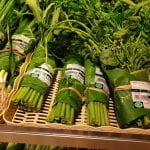Happy Earth Week!
We all love to have food at our convenience, but the food packaging that we eat in, then eventually dispose of, is unsustainable for both us and our planet. A specific type of food packaging that’s especially harmful is polystyrene foam. Polystyrene does not biodegrade yet this is the commonly used packaging because it is cheap to make and it’s known to keep food fresh longer. It is composed of benzene and ethylene which are actually two carcinogenic chemicals, and it has the potential to leech these chemicals into our food when it’s hot! Even worse, the cheap cost doesn’t cover how the styrene in this plastic has health hazards like damage to our liver, our nervous tissue, and many more. Because of illegal dumping and improper disposal of this plastic, our wildlife is affected by these leached chemicals running in their ecosystems. It’s really sad seeing how turtles can mistake these as food when they see these plastics floating around, which harms them due to malnutrition.
 Thankfully, there are ways we can improve our packaging and the goal is to try to find materials that are easily biodegradable, compostable, toxic-free, and most importantly convenient. In Asia, there has already been a practice that’s pretty sustainable. Some supermarkets make use of banana tree leaves in their packaging for things like produce, and take-out food. In the Philippines, banana leaves can be used to wrap rice pastries and it’s also been used by a fast-food chain that sells whole meals and wraps them in banana leaves, which are good at keeping the food hot and fresh because of their thick waxy layer. The concept of using large leaves with thick waxy layers is interesting to consider for packaging since they can immediately be composted.
Thankfully, there are ways we can improve our packaging and the goal is to try to find materials that are easily biodegradable, compostable, toxic-free, and most importantly convenient. In Asia, there has already been a practice that’s pretty sustainable. Some supermarkets make use of banana tree leaves in their packaging for things like produce, and take-out food. In the Philippines, banana leaves can be used to wrap rice pastries and it’s also been used by a fast-food chain that sells whole meals and wraps them in banana leaves, which are good at keeping the food hot and fresh because of their thick waxy layer. The concept of using large leaves with thick waxy layers is interesting to consider for packaging since they can immediately be composted.
Blog post by Margaux Ordoveza
Sources
Sierra Club. (2021). Polystyrene & Food Packaging. https://www.sierraclub.org/massachusetts/polystyrene-food-packaging
Redondo-Gómez, C., Rodríguez Quesada, M., Vallejo Astúa, S., Murillo Zamora, J. P., Lopretti, M., & Vega-Baudrit, J. R. (2020, August 23). Biorefinery of Biomass of Agro-Industrial Banana Waste to Obtain High-Value Biopolymers. Molecules (Basel, Switzerland). MDPI. https://doi.org/10.3390/molecules25173829
Photo sources:
Trevor Nace. (2019). Perfect Homes Chiangmai. Thailand Supermarket Ditches Plastic Packaging For Banana Leaves. Thailand Supermarket Ditches Plastic Packaging For Banana Leaves.
Food wrapped in banana leaves from Getty Images/Chatuporn Sornlampoo/EyeEm
Plastic Styrofoam photo from Natural Resources Council of Maine

